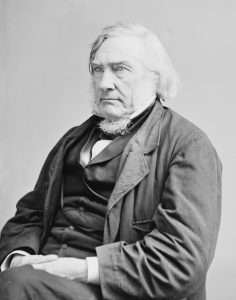The Volokh Conspiracy
Mostly law professors | Sometimes contrarian | Often libertarian | Always independent
Today in Supreme Court History: February 14, 1845
2/14/1845: Justice Samuel Nelson takes judicial oath.

Editor's Note: We invite comments and request that they be civil and on-topic. We do not moderate or assume any responsibility for comments, which are owned by the readers who post them. Comments do not represent the views of Reason.com or Reason Foundation. We reserve the right to delete any comment for any reason at any time. Comments may only be edited within 5 minutes of posting. Report abuses.
Please to post comments


Reynolds v. Atlantic Coast Line R.R. Co., 336 U.S. 207 (decided February 14, 1949): failure to clear sugar cane plants from railbed (this was Alabama) which required brakeman to cross from caboose to seventh instead of to usual sixth car to give signal was not proximate cause of his falling to his death while crossing from sixth to seventh car
Dobson v. Comm’r of Internal Revenue, 321 U.S. 231 (decided February 14, 1944): “Not every gain growing out of a transaction concerning capital assets is allowed the benefits of the capital gains tax provision”. The Court is (or was) aware that people who live off of buying and selling stocks pay a lower tax rate than those of us who work for a living, and tends to construe capital gains narrowly. Here, income was from settlement of dispute over stock sale, not from sale of stock itself.
Maty v. Grasselli Chemical Co., 303 U.S. 197 (decided February 14, 1938): applying state law (New Jersey) as to statute of limitations in a diversity action, holds that plaintiff can add allegations of another job under same employer wherein was exposed to chemicals even after statute has run
Hollingsworth v. Virginia, 3 U.S. 378 (decided February 14, 1798): passage of Eleventh Amendment was valid despite not having been formally presented to the President (obvious to us now, but this was the first time the amendment process was used) and was retroactive (plaintiff, seeking repayment from Virginia, had handed off to an out-of-state plaintiff because Chisholm v. Georgia had made it clear that a state could be sued in federal court by an out-of-state individual but not necessarily by an in-state) (Chisholm had then been abrogated by the Eleventh Amendment)
South Carolina State Highway Dept. v. Barnwell Bros., 303 U.S. 177 (decided February 14, 1938): state restriction on weight of trucks (20,000 lbs.) and width (90 inches) does not unfairly burden interstate commerce, and Congress has not preempted the field
If Hollingsworth had come out differently, it would have also taken out the Bill of Rights as it was not presented to President Washington for his signature.
Justice Nelson was President Tyler's choice, a highly respected chief justice on the New York Supreme Court.
As associate justice, Nelson administered the oath to Chief Justice Salmon P. Chase took for presiding over the impeachment trial of Andrew Johnson
He served 27 years. He wrote a narrow conflict of laws opinion in Dred Scott v. Scott, but the Court as a whole wanted to fight bigger game. He dissented in the Prize Cases, involving the president's power during the Civil War.
He died in Cooperstown. Not sure how much he liked baseball.
Stimulants Control Act Case (Second Petty Bench, decided February 14, 2003): First time the Supreme Court suppressed evidence; urine samples taken after arrest must be excluded when the officer did not present physical warrant during arrest, falsely wrote on the warrant that it was presented during arrest, created investigative reports again falsely declaring such, and lied under oath when called to the stand
Nabari City Assembly Censure Case (First Petty Bench, decided February 14, 2019): Defamation claim against city assembly for censure is justiciable; dismisses suit on the merits because courts must respect the assembly's power to discipline its members
Theft, Attempted Theft Case (Third Petty Bench, decided February 14, 2022): Defendant tried to steal debit cards by visiting the victim's home (while impersonating financial regulator), asking the victim to present the card for "verification", and swapping the actual card with a fake one - but was caught before entering that home. Court upholds attempted theft conviction, rejecting argument that theft hasn't been commenced yet
Great read thanks for the Taney-era snapshot. Could you add two quick notes for context: 1) the docket pressure and circuit-riding load the Justices faced in 1845, and 2) a link to the primary source (opinion or archival note) for that day. I’m also curious how this episode fits into mid-19th-century themes like federal power over commerce and the rise of new tech (rail, telegraph). A short “why this mattered later” line would help readers connect the history to modern doctrine.
**Title:** *Today in Supreme Court History: February 14, 1845*
On this day, the Supreme Court made decisions that shaped early American legal precedent. While details may vary depending on which cases were decided, reflecting on historic rulings helps us understand how the judiciary has evolved over time. It’s a reminder of the Court’s long-standing role in interpreting the Constitution and influencing the legal landscape of the United States.
You could expand this with specifics about the cases decided that day and their lasting impact.